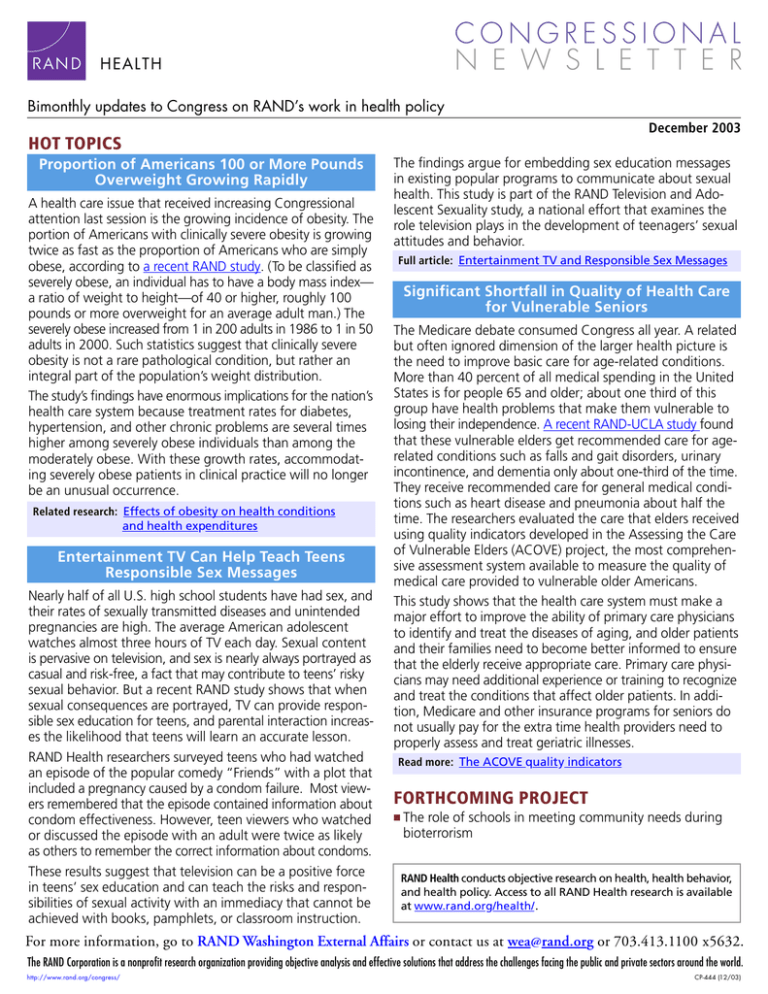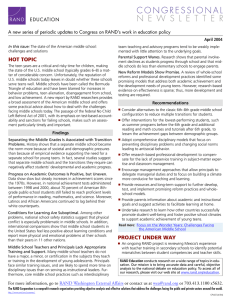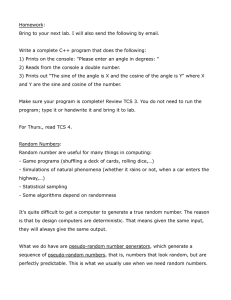
Bimonthly updates to Congress on RAND’s work in health policy
December 2003
HOT TOPICS
Proportion of Americans 100 or More Pounds
Overweight Growing Rapidly
A health care issue that received increasing Congressional
attention last session is the growing incidence of obesity. The
portion of Americans with clinically severe obesity is growing
twice as fast as the proportion of Americans who are simply
obese, according to a recent RAND study. (To be classified as
severely obese, an individual has to have a body mass index—
a ratio of weight to height—of 40 or higher, roughly 100
pounds or more overweight for an average adult man.) The
severely obese increased from 1 in 200 adults in 1986 to 1 in 50
adults in 2000. Such statistics suggest that clinically severe
obesity is not a rare pathological condition, but rather an
integral part of the population’s weight distribution.
The study’s findings have enormous implications for the nation’s
health care system because treatment rates for diabetes,
hypertension, and other chronic problems are several times
higher among severely obese individuals than among the
moderately obese. With these growth rates, accommodating severely obese patients in clinical practice will no longer
be an unusual occurrence.
Related research: Effects of obesity on health conditions
and health expenditures
Entertainment TV Can Help Teach Teens
Responsible Sex Messages
Nearly half of all U.S. high school students have had sex, and
their rates of sexually transmitted diseases and unintended
pregnancies are high. The average American adolescent
watches almost three hours of TV each day. Sexual content
is pervasive on television, and sex is nearly always portrayed as
casual and risk-free, a fact that may contribute to teens’ risky
sexual behavior. But a recent RAND study shows that when
sexual consequences are portrayed, TV can provide responsible sex education for teens, and parental interaction increases the likelihood that teens will learn an accurate lesson.
RAND Health researchers surveyed teens who had watched
an episode of the popular comedy “Friends” with a plot that
included a pregnancy caused by a condom failure. Most viewers remembered that the episode contained information about
condom effectiveness. However, teen viewers who watched
or discussed the episode with an adult were twice as likely
as others to remember the correct information about condoms.
These results suggest that television can be a positive force
in teens’ sex education and can teach the risks and responsibilities of sexual activity with an immediacy that cannot be
achieved with books, pamphlets, or classroom instruction.
The findings argue for embedding sex education messages
in existing popular programs to communicate about sexual
health. This study is part of the RAND Television and Adolescent Sexuality study, a national effort that examines the
role television plays in the development of teenagers’ sexual
attitudes and behavior.
Full article: Entertainment TV and Responsible Sex Messages
Significant Shortfall in Quality of Health Care
for Vulnerable Seniors
The Medicare debate consumed Congress all year. A related
but often ignored dimension of the larger health picture is
the need to improve basic care for age-related conditions.
More than 40 percent of all medical spending in the United
States is for people 65 and older; about one third of this
group have health problems that make them vulnerable to
losing their independence. A recent RAND-UCLA study found
that these vulnerable elders get recommended care for agerelated conditions such as falls and gait disorders, urinary
incontinence, and dementia only about one-third of the time.
They receive recommended care for general medical conditions such as heart disease and pneumonia about half the
time. The researchers evaluated the care that elders received
using quality indicators developed in the Assessing the Care
of Vulnerable Elders (ACOVE) project, the most comprehensive assessment system available to measure the quality of
medical care provided to vulnerable older Americans.
This study shows that the health care system must make a
major effort to improve the ability of primary care physicians
to identify and treat the diseases of aging, and older patients
and their families need to become better informed to ensure
that the elderly receive appropriate care. Primary care physicians may need additional experience or training to recognize
and treat the conditions that affect older patients. In addition, Medicare and other insurance programs for seniors do
not usually pay for the extra time health providers need to
properly assess and treat geriatric illnesses.
Read more: The ACOVE quality indicators
FORTHCOMING PROJECT
■
The role of schools in meeting community needs during
bioterrorism
RAND Health conducts objective research on health, health behavior,
and health policy. Access to all RAND Health research is available
at www.rand.org/health/.
For more information, go to RAND Washington External Affairs or contact us at wea@rand.org or 703.413.1100 x5632.
The RAND Corporation is a nonprofit research organization providing objective analysis and effective solutions that address the challenges facing the public and private sectors around the world.
http://www.rand.org/congress/
CP-444 (12/03)




